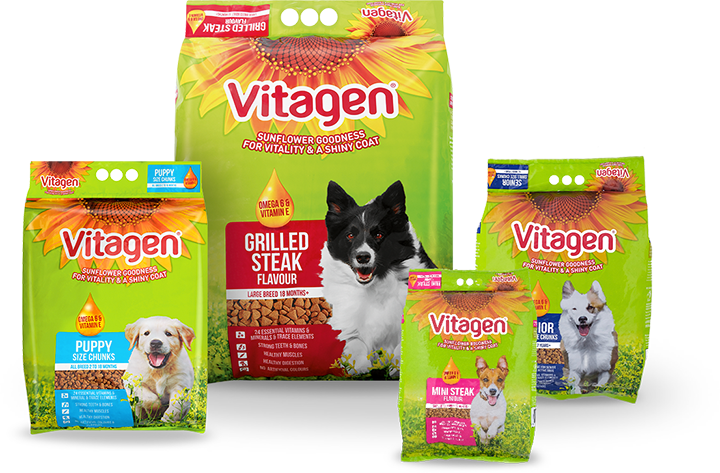Feeding Guidelines
Deciding what food to feed your puppy or adult dog can be quite challenging, so we have put together some answers to frequently asked questions to assist you. Should you not find the answer to your question here, please send it to us via email on info@afriquepetfood.com.
Things to consider when changing your dog’s diet
During your dog’s life it may become necessary to change the type and/or brand of food that you have been feeding your dog. It is normally best to follow a gradual changeover approach, over a seven-day period, rather than just switching immediately.

Why shouldn’t I feed my puppy adult dog food?
Just like humans, each stage in a dog’s life has specific dietary needs. During the puppy years, their food is designed to develop optimal brain, bone, muscle, digestive and immune functioning. Therefore, it’s food rich in vitamins and minerals that encourage this kind of growth, as well as high in calories to give them plenty of energy for exploring their new worlds.
These essential supplements aren’t found in sufficient levels in adult dog food. What’s more, the grownup pellets are too large for a puppy’s small mouth and developing teeth. Feeding your young pooch too many (or few) vitamins and minerals can lead to improper growth and health complications later in their lives.
What nutrients are essential to well balanced dog food?
It is important to ensure that your furry best friend receives all the essential components of a well-balanced meal.
Ingredients that are crucial to the healthy development and maintenance of your cat or dog include:
- Proteins for tough muscles and tissues, as well as amino acids that rebuild damaged cells;
- Carbohydrates to provide the energy they need throughout the day;
- Good fats with oils that aid vitamin absorption, promote shiny coats and mental acuity;
- Vitamins and minerals vital for strong teeth and dense bones. Bear in mind, however, that your pets needs change as they age, and according to their breed.
Foods I shouldn’t give my puppy or adult dog
Pet owners need to be very careful about exactly what your pooch is eating. Certain kitchen items are not fit for canine consumption. Here’s a list of the most hazardous:
- Chocolate – White, milk, dark and baking chocolate have progressively higher levels of toxicity in them. As a rule, the more bitter it is, the more poisonous it is to your dog. Although, the large quantities of fat and sugar in lighter varieties aren’t good either.
- Grapes and raisins – This food in every variety is poisonous to dogs and, unfortunately, hounds hardly show any sign of illness until severe damage has been done to their kidneys. You’ll need to keep your eyes peeled for unusual sleepiness, stomach pain, lack of appetite, vomiting or diarrhoea.
- Xylitol – This substance is commonly found in sugar-free products, such as gum, mints and certain toothpastes. When a dog gets his paws on any of these items, their bodies produce an excess of insulin that can rapidly drop to fatal levels. A weak, tired or shaky pup that vomits or collapses may be showing signs of Xylitol poisoning.
- Macadamia nuts – While these items aren’t lethal to canines, eating just a few of them can paralyse your dog for 24 to 48 hours. The human snack has a highly negative affect on their nervous systems, hindering muscle function.
- Raw bread dough – Prepared with yeast and eaten by your pooch, dough expands in their oven-like tummies and then disintegrates into carbon dioxide gas and alcohol. You’ll have to watch for a swollen stomachs, dry heaving and weakened limbs. If unnoticed, this can escalate to seizures and gastric dilatation.
Why it’s important to provide fresh water for your dogs
Every living cell in animal bodies is mostly made up of water. It’s a carrier of vital nutrients, helps digestion by aiding the absorption of vitamins and minerals, regulates your basal temperature, lubricates joints and removes internal waste. Therefore, insufficient quantities of this essential substance have a wide range of negative effects on your dog’s health.
The result can be minor dehydration or life-threatening organ failure. We advise that you keep their bowls filled with clean water every day. You should also provide more H2O on hot days, when your dogs are especially active or if your pooch is pregnant. A dry nose and gums, as well as skin tenting are all signs to look out for.
Available from:

